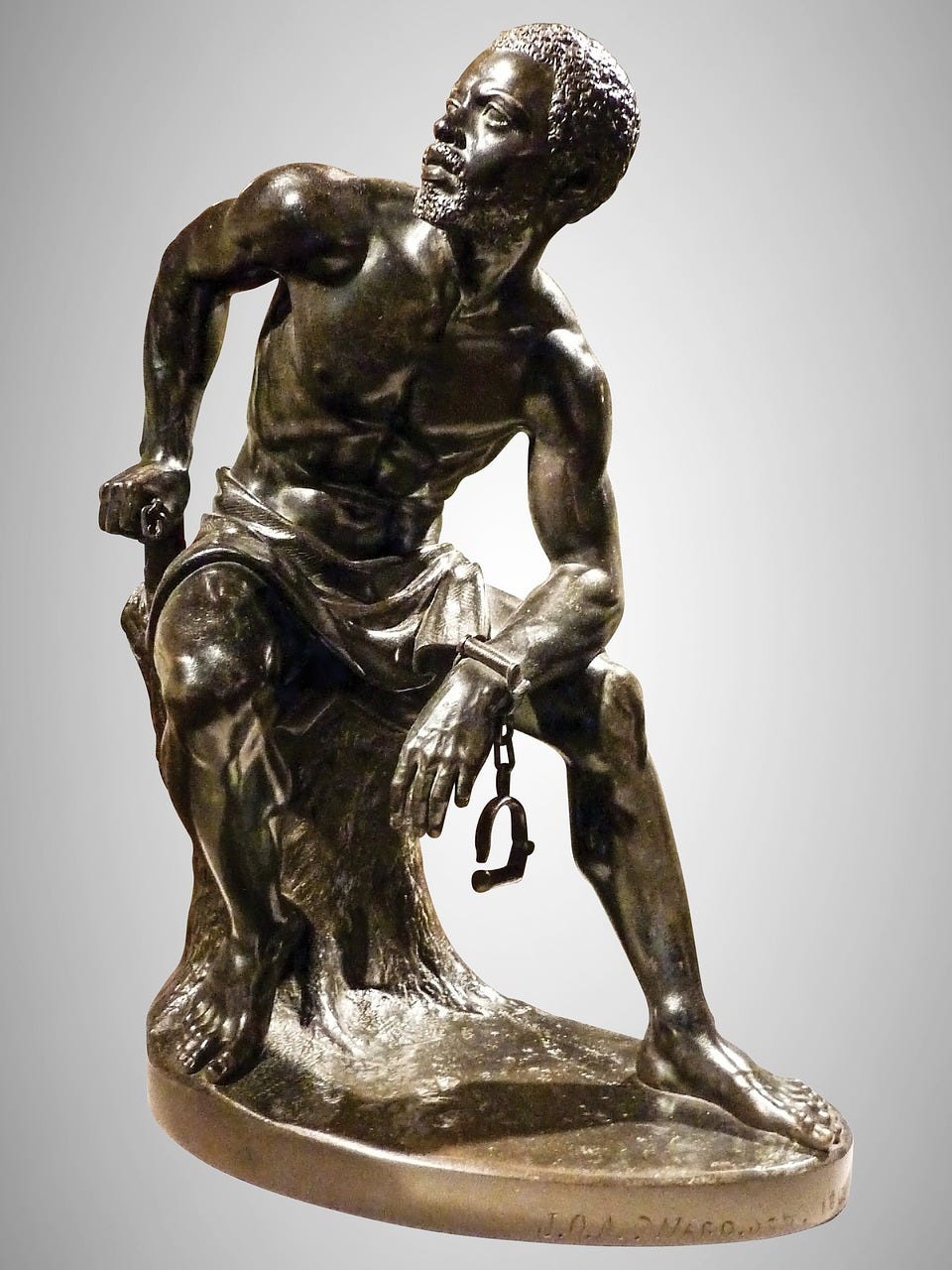How do you know you aren't a slave?
If you are sure that you aren't, maybe you are...
There is much talk about freedom and democracy these days. Some think the two terms are very nearly synonymous. They are not.
And there is much talk about slavery, as if it is a thing only of the past. It is not.
I’ve spent much time thinking about what freedom is, and what slavery is. These things don’t get considered well enough.
Plantation slavery of the antebellum period is nearly the only slavery most people even know of. But it is largely an anomoly, atypical of what slavery has been in most times and places. So, what is a slave? What isn’t a slave? Is it when one person holds title, has an actual document that says they own someone else? Sometimes yes, and sometimes no. Certainly, one can be a slave with no documentation at all.
For Frederick Douglass, for example, there was no paperwork to say he was a slave, and in fact no one in the slave-owning family was certain who owned him. If Douglass had sued in court to claim his freedom, there was no documentation to prove that anyone owned him. Yet, we can be sure that no court would have set him free.
Slavery was a tradition that superseded legal principle, or even actual law. Many slaves were themselves not sure what an existence outside of slavery might mean. Was it true that the black man’s lot was to serve white people? Not all were sure that it was not true. That’s what generations of indoctrination can do. In Solomon Northup’s autobiography, ‘Twelve Years a Slave’, he tells of slaves talking with him about what it means to be free. Imagine having to ask about it, because you don’t know. Northup considers their question, and can’t give an easy to digest answer. There are, after all, advantages in having someone else run your life, make all the decisions. But Northup tells them that, all things considered, if they can find a way to be free, go for it.
If you had a choice between being free or being a slave, which would you choose? Stupid question? Let’s consider. First, I would suggest that no one can be absolutely free. We bind ourselves to each other for both emotional and practical reasons. Absolute freedom is something that none of us want. Well then. Let’s start from the other direction. How much do you like the idea of being a slave? You don’t? Are you sure? Frederick Douglass was not owned, was not a slave in any legally recognizable manner. He was a slave by tradition. What about you? Do you think for yourself, or are you programmed into some tradition? Who did the programming? Who does the programming? Maybe, you are a slave.
Who do you like? Who do you not like? Why? Are they really your choices, your personal decisions, or are you enslaved to someone else’s ideology. To what extent do you set your own direction? To what extent will you openly disagree with those around you, even when there’s just one of you and many of them? How about silent disagreement? Do you assess what you hear, read and see? Or do you accept the dictates of a certain group, taking everything they say as gospel, and reject any others? Do you read, listen and watch media critically, or as a means to reinforce what you’ve been trained to believe? As you consider this, remember that there were plantation slaves who had been convinced that they were fortunate to be slaves.
Frederick Douglass somehow got it in his head that, despite his birth status, despite his training, despite tradition, he would not go along. He would go his own direction, no matter how much effort it took. Being a slave, following the tradition, would have been far easier for Douglass. Many will accept their slavery rather than make the kind of effort, the continual effort, that it takes to be free. Some consider themselves fortunate that they have others to make their decisions for them. How about you?
I seem to have a habit of thinking of songs that don’t quite make my point but dammit, they’re GOOD!
Here’s another one.
Bob Dylan-Gotta Serve Somebody
Comments?






There is logic, there is language, and there is law. They are three different things. I would advise you don't get confused by trying to analyze one using the other two.
Dred Scott v Sanford (1857) held that no person born into slavery can ever be treated as a free person. This ruling superseded all cases of manumission, and therefore slavery was therefore extended into the "free" states. Then came the Emancipation Proclamation (1863) that, as a wartime measure, attempted to set the former slaves where the United States courts could not reach. This presidential directive was never legally challenged. When Amendment XIV was ratified by enough states (1866), no person could be held in bondage in the United States.
Now...
Your tautological argument could, based on your "logic," argue that no one is a human being because, after all, it's really just a state of mind. As is, based on your "reasoning," the state of slavery.
But...
This is a word game, nothing more. And a game of perceptions. Once again, don't confuse logic, the law, and language.